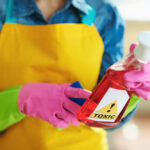DNA repair damaged by exposure to cancer-causing household products
 (NaturalHealth365) If you’re not favoring organic, chemical-free personal care product choices or natural solutions whenever possible, you (quite frankly) are probably raising your risk of getting cancer. New research has verified the link between toxic chemicals called aldehydes, the destruction of DNA repair mechanisms, and a higher risk of cancer due to their effects at the cellular level.
(NaturalHealth365) If you’re not favoring organic, chemical-free personal care product choices or natural solutions whenever possible, you (quite frankly) are probably raising your risk of getting cancer. New research has verified the link between toxic chemicals called aldehydes, the destruction of DNA repair mechanisms, and a higher risk of cancer due to their effects at the cellular level.
Aldehydes are known cancer-causing substances that have become increasingly pervasive in our modern living environment. In addition to being found in a range of building materials and household products, they are also in many consumer products such as cosmetics, shampoos, conditioners, and body lotions.
Toxic environmental chemicals like aldehydes impede DNA repair and trigger cancer cell growth
The cells are the most vulnerable to cancer and other diseases during the cell division process. The body does have a defense system to protect cells and immediately repair damage once it occurs; however, the presence of toxic chemicals from our environment can dramatically impede this rejuvenation process.
Aldehydes and many other substances, like food dyes, impede the DNA repair process, which is essential to cellular health and overall health. Specifically, aldehydes are known to deplete the protein BRCA2, which normally has tumor-suppressing abilities. Without it, cancer tumors can grow and proliferate more rapidly.
Problems with the BRCA2 gene, found in 1 of every 100 people, increase vulnerability to toxic chemicals
A study out of the University of Cambridge Medical Research Council Cancer Unit used genetically engineered human cells as well as cells with faulty BRCA2 to identify how aldehyde exposure can cause cancer.
While looking at cell activity, the researchers found exposure to these toxic chemicals had the effect of creating genomic instability while also depleting BRCA2 activity. In addition, those who have a faulty BRCA2 gene are already more susceptible to cancer, and exposure to aldehydes only exacerbates the issue.
Protein levels are essentially pushed down below what’s required for DNA repair, paving the way for mutations, cancer formation, and tumor growth. Around 1 in 100 people are suspected of carrying a faulty BRCA2 gene.
Avoid toxic chemicals in personal care products, foods, and household items
Aldehydes are in the air we breathe from car exhaust and cigarette smoke. They are even in some foods we eat, especially processed and fried selections. Aldehydes are also one of the by-products left behind in the body after consuming alcohol.
Because of their negative effects and how they impede DNA repair, these toxic chemicals should be avoided as much as possible. Too much exposure to aldehydes can pave the way for getting cancer.
What can you do? The best ‘first step’ is to be much more conscious about every purchase you make. Never underestimate the power of making good buying decisions at the grocery store or even bigger decisions about building and decorating your home.
Bottom line: You CAN significantly minimize your exposure to aldehydes and toxic chemicals through your lifestyle, product choices, and dietary habits. Favor eco-friendly, natural, organic cleaning and personal care product choices whenever possible.
Eat a healthy (organic, locally grown) diet – as much as possible – with plenty of antioxidants sourced from organic fruits, vegetables, and nutritional supplements packed with vitamin C, quercetin, and alpha lipoic acid. (to name a few)
Sources for this article include:



